Long run pays big for Eschete-Pizzolato
Massive day-three limit secures close win at Venice Redfish Series event
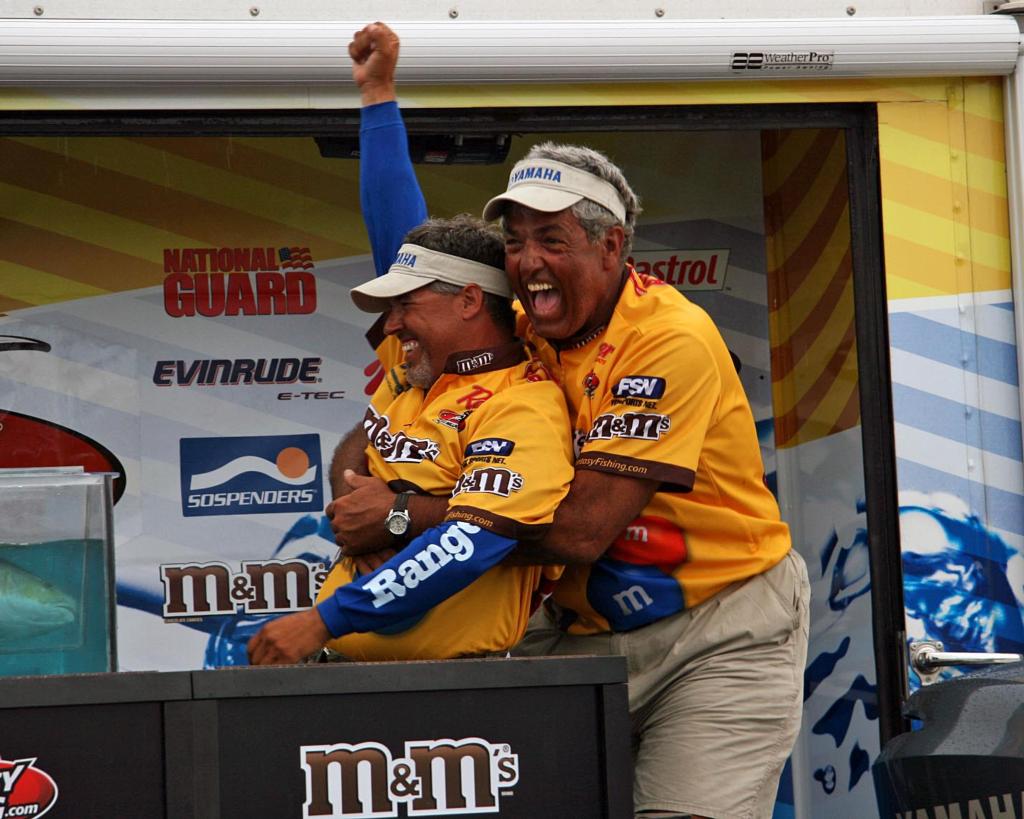
VENICE, La. – They knew they wouldn’t have long to fish, but Dwayne Eschete of Mandeville, La., and Blake Pizzolato of Montgomery, Texas, clearly made the right call by running over 100 miles to Cocodrie, La., and bagging a spectacular catch that earned them the Wal-Mart FLW Redfish Series Western Division win and a $50,000 payday.
Eschete said he caught eight fish over 8 pounds in the Cocodrie marsh during practice. More 8-pounders showed their hungry sides on the final day, as he and Pizzolato caught a 17-pound, 4-ounce limit that pushed their tournament total to 48-11 and allowed them to squeak past day-two leaders and 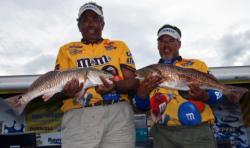 local titans Todd Dufour and Alden Bourgeois by a mere 5 ounces.
local titans Todd Dufour and Alden Bourgeois by a mere 5 ounces.
Fishing 3-inch white Berkley Gulp Shrimp, the anglers targeted broken marsh and put a 7 ¾- and an 8 ¾-pound redfish in their livewell around 9 a.m. About an hour and a half later, Blake stuck a fish that went 8-plus. That hookup would give the team a competitive limit, but a tough fight in hot, shallow water left the fish tired and the anglers worried.
Pizzolato stopped fishing and went to work reviving the fish and making sure it remained healthy, while Eschete used the trolling motor to ease the boat out of the area. That’s when the team got its early Christmas present.
“Blake kept tending to the fish, and I got on the trolling motor to ease us out of that spot. The pond went back into a little pocket, and once we caught that fish, the rest of them started pulling out. At that point, we were more concerned about the fish we had in the boat than trying to catch another one, because we wanted to make sure this fish stayed alive.
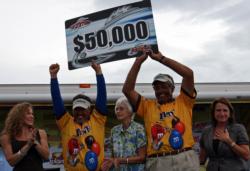 “We figured we had 16 pounds, so we were feeling good about it. I started easing us out of there, but looking. I looked down and saw another 8-pounder coming right at me, so I dropped my bait in front of him, he ate, and we left at 10:30.”
“We figured we had 16 pounds, so we were feeling good about it. I started easing us out of there, but looking. I looked down and saw another 8-pounder coming right at me, so I dropped my bait in front of him, he ate, and we left at 10:30.”
Now, the thing about good fortune is that it often whets one’s appetite for achievement and begs the question: “Is there something even better?” That temptation crossed the minds of the soon-to-be-victorious anglers, but they made a wise call and decided to go home with what they had.
“Our biggest concerns were that we still had to go get gas, we were in a pond where the day before we got stuck, it’s getting late. But then you start thinking `Can we do better?’
“I knew there were some 9-pounders in that pond – I’ve caught 9-pounders there. But I didn’t want to risk sacrificing what we had.”
In the bigger picture, the winners decided to make the long run to Cocodrie not only because of its 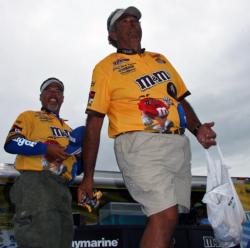 promise of big fish, but also for catch maintenance reasons. Unlike the brackish habitat spanning most of the Mississippi Delta, Cocodrie’s marsh comprises purely saltwater in which stressed redfish typically fare best.
promise of big fish, but also for catch maintenance reasons. Unlike the brackish habitat spanning most of the Mississippi Delta, Cocodrie’s marsh comprises purely saltwater in which stressed redfish typically fare best.
“I practiced in Delacroix (northeast of Venice), where probably 50 percent of the field fished during the tournament,” Eschete said. “The problem I had was that I had trouble keeping fish alive. That’s one of the reasons we fished in Cocodrie.”
On the weigh-in stage, Eschete brought a hush to the crowd and dampened many eyes when he explained the significance of the win: “Blake’s dad passed away in November, and he told me he wanted to win a tournament and dedicate it to his dad. So here we are – I’m proud to be part of it, Blake’s happy. It just means a lot to us.”
Later, Pizzolato said: “I wanted to win one for my dad. Tomorrow’s Father’s Day, so I’m going to see him, and he’s going to get a trophy.”
Dufour-Bourgeois slip to second
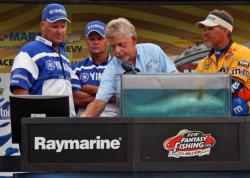 Todd Dufour and Alden Bourgeois led the field into day three with the momentum of two 16-pound days. Weighing 16-9 on day one and 16-8 on day two, the veteran guides from Marrero, La., and Barataria, La., were the only duo to catch two 8-pounders during both qualifying rounds. However, their run ended prematurely, and their final-round weight of 15-5 yielded a second-place total of 48-6 worth $17,272.
Todd Dufour and Alden Bourgeois led the field into day three with the momentum of two 16-pound days. Weighing 16-9 on day one and 16-8 on day two, the veteran guides from Marrero, La., and Barataria, La., were the only duo to catch two 8-pounders during both qualifying rounds. However, their run ended prematurely, and their final-round weight of 15-5 yielded a second-place total of 48-6 worth $17,272.
“We didn’t get enough bites from the big fish – it’s as simple as that,” Dufour said. “We saw plenty of fish. We caught some that were a little too big; we caught some that were a little too small.
“My hat’s off to (Eschete and Pizzolato). When you pull off something like that, they deserve (the win). I don’t feel bad because that’s just a phenomenal weight.”
Dufour and Bourgeois stuck with the same basic game plan they followed on days one and two – fishing the channels and drains of shallow duck ponds in Lafitte. They threw spinnerbaits and scented soft-plastic shad tails on ¼-ounce jigheads.
Reupke-Duxstad third
Steve Reupke and Frank Duxstad, both of Port Aransas, Texas, spent the entire tournament in the 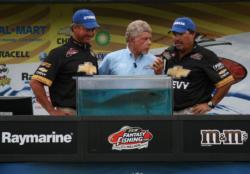 Delacroix Marsh. Sight-fishing in about a foot of water, they threw Exude Shrimp in clear and red patterns. Their day-three catch of 14 pounds, 14 ounces boosted their tournament total to a third-place 46-3 and a $6,116 payday.
Delacroix Marsh. Sight-fishing in about a foot of water, they threw Exude Shrimp in clear and red patterns. Their day-three catch of 14 pounds, 14 ounces boosted their tournament total to a third-place 46-3 and a $6,116 payday.
Duxstad said the fish weren’t as cooperative as they had been in previous visits: “We finally had to get up and chase a few schools because the fish we found, we just couldn’t get them to bite. They would hear the trolling motor and run from us.
“We were the only ones fishing in this area, and we weren’t running them too hard. I think it was the weather conditions. When it gets real calm and the water gets that sheen on it, they just get really spooky. They knew we were there, and they didn’t like it.”
Duxstad said that one of his team’s weight fish came early, around 9 a.m., and the other about 30 minutes before they had to return home.
Fontana-Grose finish fourth
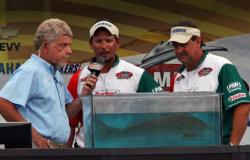 Sal Fontana of Metaire, La., and Tony Grose of New Orleans fished duck ponds in the Port Sulfur area on the west side of the Mississippi River. In this shallow, grassy environment, the anglers caught a limit weighing 13 pounds, 11 ounces and tallied a fourth-place total of 45-10 worth $4,808.
Sal Fontana of Metaire, La., and Tony Grose of New Orleans fished duck ponds in the Port Sulfur area on the west side of the Mississippi River. In this shallow, grassy environment, the anglers caught a limit weighing 13 pounds, 11 ounces and tallied a fourth-place total of 45-10 worth $4,808.
“We tried to find the cleanest water that we could, but the water in our main ponds was dirty – it was like chocolate milk,” Fontana said. “So we decided to run to some secondary ponds that we hadn’t fished (during the tournament). We pulled in, and the fish were there.”
Berkley Gulp Shrimp in new-penny color rigged weedless on worm hooks with small weights proved most effective. “We would get a lead on them, throw it out, reel it in, and drop the baits in front of them and wait for them to decide to eat.”
Snopek-Hallmark settle into fifth
Fishing the popular Delacroix Marsh area, day-one leaders Steve Snopek of New Braunfels, Texas, and 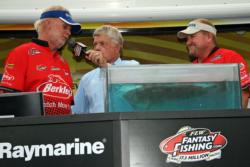 Trey Hallmark of San Antonio, Texas, threw gold and copper spoons and caught two fish weighing 10 pounds, 13 ounces on day three for a 42-1 total that earned them fifth place and $3,106.
Trey Hallmark of San Antonio, Texas, threw gold and copper spoons and caught two fish weighing 10 pounds, 13 ounces on day three for a 42-1 total that earned them fifth place and $3,106.
For two days, they caught their best fish by aggressively working the edges of dense hydrilla patches. However, by day three, fishing pressure had increased to the point of pushing the bigger fish deep into the cover and out of casting range.
Hallmark said a heavier day-three load – cameraman and gear – prevented the team from poking into the shallow sweet spots. “We could see the fish, but we just couldn’t get to them.”